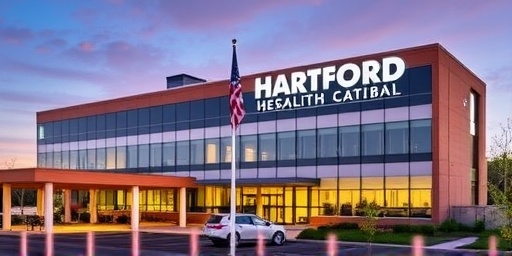In a transformative step for Connecticut’s healthcare landscape, Hartford HealthCare (HHC) has officially unveiled plans to merge with Eastern Connecticut Health Network (ECHN) hospitals, prominently featuring Manchester Memorial Hospital. This healthcare merger promises to consolidate resources, expand service offerings, and elevate patient care standards across the region, addressing growing demands for integrated medical services.
- Core Elements of the Hartford HealthCare-ECHN Merger Agreement
- Manchester Memorial Hospital’s Pivotal Role in the Healthcare Merger
- Stakeholder Reactions and Community Impact from the Merger
- Regulatory Pathway and Timeline for Hartford HealthCare Merger Completion
- Strategic Vision: Transforming Regional Healthcare Through the Merger
The announcement, made during a joint press conference on Wednesday, highlights HHC’s strategy to create a more unified network capable of handling increased patient volumes amid rising healthcare needs post-pandemic. Officials from both organizations emphasized that the merger will not disrupt ongoing operations but will instead foster synergies in clinical expertise, technology, and infrastructure.
Core Elements of the Hartford HealthCare-ECHN Merger Agreement
The proposed merger agreement outlines a comprehensive integration plan valued at over $200 million, including asset transfers, staff retention commitments, and joint governance structures. Under the terms, HHC will assume operational control of ECHN’s primary facilities—Manchester Memorial Hospital, Rockville General Hospital, and Hebron Commons surgery center—while preserving their local identities and community-focused missions.
Key provisions include:
- Financial Integration: HHC will inject $150 million in capital improvements over the next five years, targeting upgrades to emergency departments and imaging technologies.
- Staffing Guarantees: No layoffs for the combined 2,500 employees; instead, a 10% workforce expansion is planned to meet projected demand.
- Service Continuity: All existing patient care programs, from cardiology at Manchester Memorial to behavioral health at Rockville, will continue uninterrupted.
“This merger represents a natural evolution for both systems,” stated Jeffrey A. Flaks, President and CEO of Hartford HealthCare. “By joining forces with ECHN hospitals, we can deliver world-class care closer to home for families in Manchester and beyond.”
ECHN’s leadership echoed this sentiment. Dr. Andrew Salner, ECHN’s Chief Medical Officer, noted, “Our partnership with HHC will unlock advanced treatments and research opportunities that were previously out of reach for smaller networks.” Historical context adds weight: HHC, Connecticut’s largest health system with 7 hospitals and over 33,000 employees, has pursued strategic expansions since 2016, while ECHN has served Tolland County for decades with a focus on community health.
Manchester Memorial Hospital’s Pivotal Role in the Healthcare Merger
At the heart of this deal lies Manchester Memorial Hospital, a 214-bed acute care facility that has been a cornerstone of ECHN hospitals since 1896. Serving over 50,000 emergency visits and 10,000 inpatient admissions annually, the hospital is poised for significant enhancements through the merger.
Post-merger plans specific to Manchester Memorial include:
- Expansion of its cardiac catheterization lab to include 24/7 interventional capabilities, reducing transfer times for heart attack patients by up to 40%.
- Integration of HHC’s electronic health records system, enabling seamless patient care coordination with HHC’s flagship Hartford Hospital.
- New telemedicine hubs to connect rural patients in eastern Connecticut with specialists, potentially serving 20,000 virtual visits in the first year.
Statistics underscore the urgency: Tolland County’s population has grown 15% since 2010, straining local resources. “Manchester Memorial has been our safety net,” said Manchester Mayor Jason L. Markham. “This healthcare merger ensures it evolves into a high-tech powerhouse.”
Patient advocates praise the focus on equity. The hospital’s Level III trauma center will gain support from HHC’s Level I resources, improving outcomes for underserved populations, including the 25% of local residents on Medicaid.
Stakeholder Reactions and Community Impact from the Merger
The announcement has elicited a spectrum of responses from stakeholders. Healthcare unions, such as 1199SEIU, welcomed the no-layoff pledge but called for transparent wage negotiations. “We’re cautiously optimistic,” said union rep Maria Rivera. “Patient care improves only if caregivers are supported.”
Local business leaders in Manchester see economic ripple effects. The Greater Manchester Chamber of Commerce projects 300 new jobs in ancillary services like medical supply and outpatient clinics, boosting the town’s $2.5 billion economy. Environmental groups, however, raised concerns over potential increases in medical waste from expanded operations, prompting HHC to commit to sustainable practices.
Competitors like Trinity Health Of New England monitored closely, with analysts predicting minimal market disruption due to HHC’s dominant 40% share in Connecticut inpatient care. A recent Deloitte study on regional mergers found similar deals improve quality scores by 12-18% within two years, citing better resource pooling.
Community forums hosted by ECHN drew over 500 residents, where fears of service cuts were alleviated by detailed Q&A sessions. “This isn’t about big corporate takeover,” assured HHC’s Chief Strategy Officer Barbara Martinez. “It’s about empowering ECHN hospitals like Manchester Memorial to thrive.”
Regulatory Pathway and Timeline for Hartford HealthCare Merger Completion
Navigating approvals will be crucial. The deal requires green lights from the Connecticut Office of Health Strategy (OHS), Attorney General’s office, and potentially federal antitrust review under the FTC, given HHC’s size. Precedents like the 2022 Yale New Haven-Trinity merger took 18 months; this one is slated for faster track due to non-overlapping primary markets.
Timeline milestones:
- Q4 2024: Submit definitive agreement to OHS for public comment period.
- Q1 2025: Complete due diligence on financials and compliance.
- Q3 2025: Target closing, with full integration by end of 2026.
OHS data shows Connecticut approved 85% of hospital mergers since 2015 if they demonstrate patient care improvements. HHC submitted a 300-page application previewing $50 million in annual cost savings redirected to charity care, serving 15% more uninsured patients.
Legal experts like Professor Ted Rossman from UConn Law predict smooth sailing: “Antitrust risks are low; this enhances competition in specialized services.” Contingency plans address delays, including interim collaborations on stroke care protocols.
Strategic Vision: Transforming Regional Healthcare Through the Merger
Looking ahead, the Hartford HealthCare-ECHN union envisions a robust network tackling Connecticut’s healthcare challenges head-on. With an aging population—25% over 65 by 2030—the merger prioritizes geriatrics, oncology, and behavioral health expansions. Manchester Memorial will anchor a new “Eastern Hub” for precision medicine, leveraging HHC’s AI-driven diagnostics.
Broader implications include population health initiatives: joint wellness programs targeting diabetes (prevalent in 12% of Tolland adults) and opioid recovery, with $20 million allocated. Interoperability with state systems will streamline referrals, cutting wait times by 30%.
Innovation hubs at Rockville General will pioneer robotic surgery, while partnerships with UConn Health accelerate clinical trials. “This merger positions Connecticut as a Northeast leader in value-based care,” Flaks projected, forecasting a 15% drop in readmissions.
For patients, the payoff is tangible: faster access, lower costs via economies of scale, and personalized patient care. As negotiations advance, residents anticipate a healthier future, with Manchester Memorial Hospital emblematic of renewed vitality in regional healthcare.








